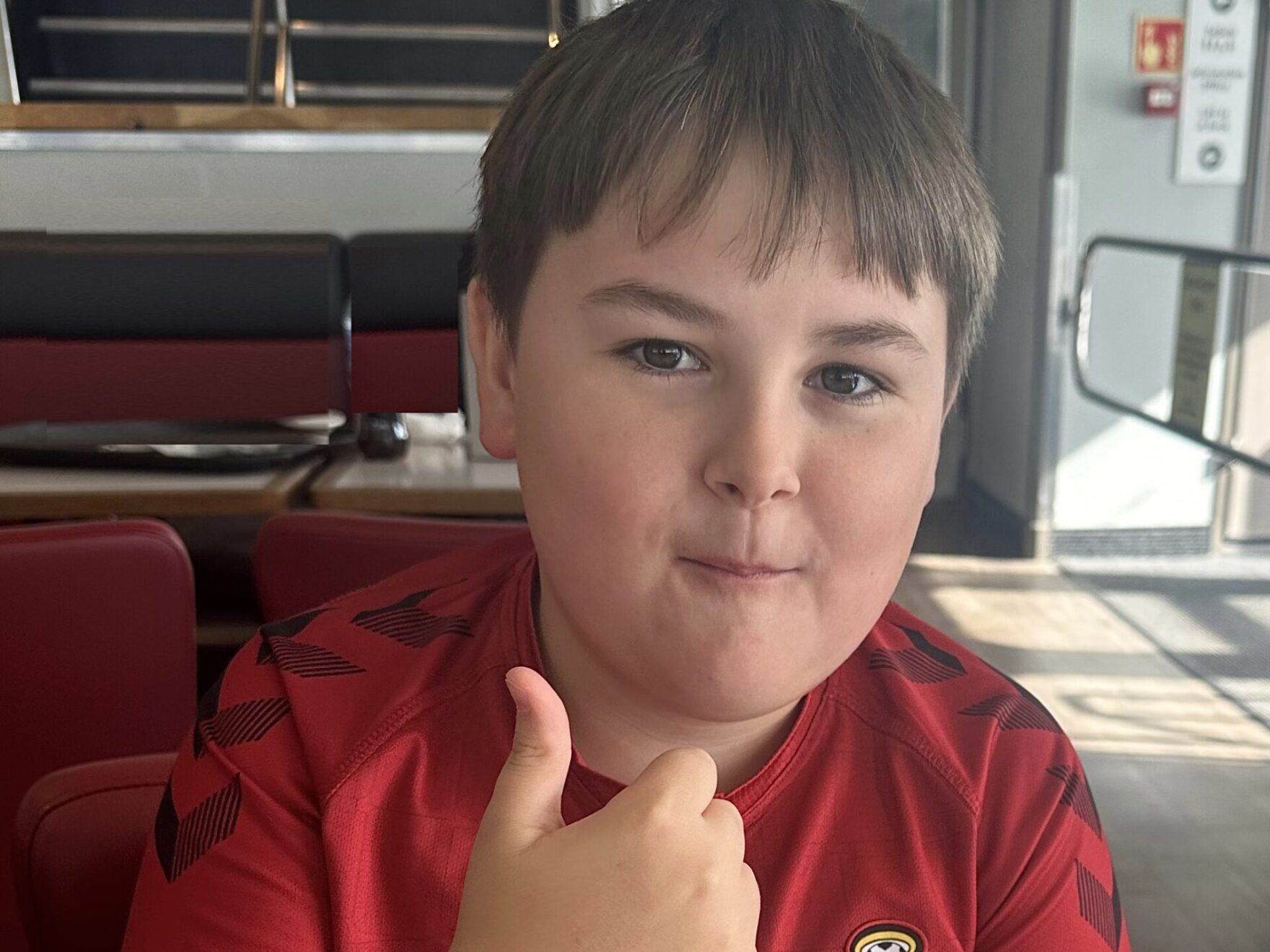Anti-MOG Receptor Autoimmune Encephalitis – Theo’s Story

Maria, shares the story of her son, Theo, who was diagnosed with Anti-MOG receptor Autoimmune Encephalitis when he was just 6 years old.
Symptoms
In September of 2018, we had not long returned from a family stay at Legoland to celebrate Theo’s 6th birthday and were due to be having a birthday party with all of his school friends the following week.
That Tuesday morning, Theo walked into our bedroom with a slightly dazed look saying he felt sick and proceeded to lie on our bed. Within minutes, he had his first tonic clonic seizure. It continued for several frantic minutes while paramedics made their way to us. A few hours later we were let go from A&E saying that it’s not uncommon to have an unexplained afebrile seizure and many people never go on to have another.
Theo slept for more than 24 hours after that and when he woke up it was clear to me that something was different with him. I remember thinking he had a blank look behind his eyes. As a Mum, I could sense something was ‘off’ and thought it must be a result of the seizure.
The next few days were very confusing. Theo opened the front door and ran as fast as he could out into the road without any concern for cars and continued running. When I finally caught up with him he was just as confused as me and had no idea what he was doing or where he was going. We soon learnt that this was going to be an ongoing theme as Theo’s brain appeared to have an urge to abscond wherever he was.
We pressed on with his birthday party but he hid under a table throughout, appearing to be overwhelmed by the music and people. . My husband had to sit with him in a locked car until people had left as he was quite literally out of control by this point.
I phoned for an emergency appointment and the GP was concerned with the history of a recent seizure and now altered behaviour. She rang the hospital and arranged for him to be admitted. We had a week’s stay for observation where the Paediatricians came round each morning. He was passing the neurological tests of touching his nose and balancing, albeit with notes that he was very uncooperative. Due to this, they did not arrange for a neurologist to see him.
The nurses were constantly telling Theo off for being ‘naughty’. He was kicking, lashing out and continually trying to escape. I was so frightened that everything was being put down to him being a misbehaving child; nobody seemed to acknowledge when we said that his usual personality was incredibly different and he was normally quiet, friendly and placid.
Diagnosis and Treatment
After the week, Theo was discharged with antibiotics as the only blood test results of note showed inflammation. They did scan him as a precaution but it hadn’t revealed anything remarkable which was reassuring but confusing in equal measures. The discharge paperwork had the diagnosis of ‘Behavioural Disorder’!
Against every better instinct, I took him home. Within days, things were getting worse. I remember him having a games console that he would only play if it was on 100% battery. Within a few minutes it would drop to 99% and he’d become inconsolable that it was running out. There was no reasoning with him; he would become hysterical. I felt like I was losing him more and more each day. He went from articulate to barely communicating; purely displaying aggression and violence.
Less than a week after coming out of hospital, there was an incident where he hurt his sister, who was 3 at the time. That was the final straw for me and I took him back to stand my ground and insist on answers. This time a paediatrician reluctantly offered a lumbar puncture which was booked in for a few days later.
On the day of the lumbar puncture, we finally saw a neurologist who spent a great amount of time observing Theo.
Within a few hours we heard the word for the first time… encephalitis.
The neurologist said, “I am confident that this is encephalitis; I just can’t say which type.”
He was admitted to a private room and was given IV Keppra (for seizures). The next day, once they had ruled out an infectious encephalitis type, they were able to start IV steroids. He became more communicative within those 3 days and we felt an incredible sense of relief. However he was still not himself at all. After 3 days he was swapped to oral Prednisolone for a week and we could go home. We were told that he may keep improving, but it’s not possible to tell.
Re-admission
Things did not improve and he began declining again. We returned for an outpatient follow up with the neurologist who advised us that he now had Theo’s antibody results. He had tested positive for MOG antibodies and had high titers. This wasn’t something the neurologist had expected, due to the fairly normal MRI and he was presenting with more psychiatric symptoms better fitting with Anti-NMDAR.
Theo spent this appointment under the neurologist’s table and was still far from the boy that we had known for the first 6 years of his life, but none the less, the neurologist felt that he had been treated so we were given no further options for him.
Throughout this, I called your charity and had wonderful support from Jon. He helped me when I was in despair and his advice was invaluable. . We got a referral to a hospital to see MOG specialists to see if there were options for Theo.
At the initial appointment with a whole team of neurologists, Theo was crawling around their feet and untying their shoe laces! They agreed that the MOG still appeared to be causing autoimmune encephalitis. They liaised with Theo’s local neurologist and he was once again admitted for 5 days of IV steroids and a much stronger oral dose to taper afterwards. In fact, he had to do a very slow taper for 14 months.
Within a few months of this treatment, Theo was so much better. Within that year he completely returned to baseline. He had a final tonic clonic seizure in early 2019 (while still tapering) but the improvements continued regardless. The violence, confusion and disorientation totally disappeared and he returned to his wonderful former self.
On-going experience
I will always be incredibly grateful to the two hospitals for working together and giving Theo back his ‘normality’. He had a fantastic 6 years, symptom-free and thriving; completely aced his primary school SATs and entered secondary school in the highest sets for Maths and English. I got my chilled, happy, clever boy back.
Unfortunately in December 2024, quite out of the blue, he had a tonic clonic seizure. These have now continued into 2025 and we’ve had ambulance trips and a new hospital stay. We are still working on finding anti-epileptic drugs that are best suited to Theo.
Since the re-emergence, he’s now struggling with school, severe OCD, anger and confusion. This is thought to be the medication (Keppra) so we’re waiting on a new plan. Theo remains positive for MOG; but with lower titers. His MRI shows a lesion on his left hippocampus and some flair on his optic nerves but we’ve been advised this is longstanding so doesn’t warrant treatment.
With this new diagnosis of epilepsy, I am confident that once we get the correct plan in place, we should get him back to baseline again but it’s terrifying living with the unpredictability of the seizures and the fact that it will impact his independence at the moment.
From what I understand, as Theo has remained positive for MOG since his initial diagnosis, he will always be at risk of an attack but we know the signs to look for and we’re in good hands with both hospitals. Occasionally it feels like I’m looking over my shoulder for the return of encephalitis, but we live in the moment.
If you would like to speak to our team about encephalitis, please contact our helpline.
Story published August 2025
Get help
Our support team are available from 9am to 5pm (GMT), Monday to Thursday, and 9am to 4.30pm (GMT) on Fridays.
To get in touch, simply call +44(0)1653 699599.
Contact our helpline
